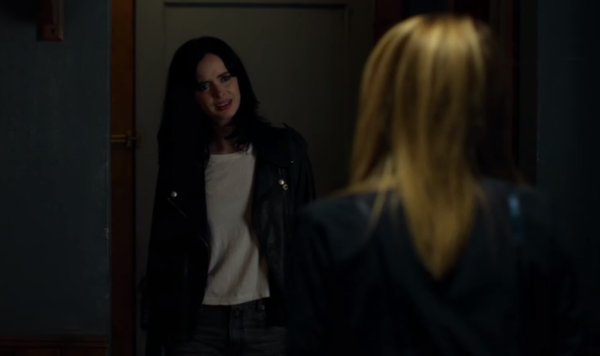Eammon Jacobs reviews the third and final season of Jessica Jones…
The age of Marvel’s Netflix shows has finally come to an end with Jessica Jones‘ third season. After a disappointing second season, it’s a return to form for the superhero private eye. It doesn’t quite reach the dizzying heights of the first season, but then without David Tennant’s wickedly twisted villain, Kilgrave, how could it? There’s a glaring sense of finality baked into the thirteen episode run, and it’s quite clearly a farewell to this TV universe. But it’s definitely an enjoyable send-off. Krysten Ritter expertly spits her lines of iconic witty cynicism right from the get go. But as she struggles against a wave of PTSD after an attack in the first episode, the series reminds us that she’s not an all-powerful superhero. She’s vulnerable, yet strong. Tough, but still wholly hurt by being betrayed by some of those close to her in the underwhelming second season.

It does take a little while to get off the ground, deciding to break the dramatic cliffhanger in the opener with a Trish-centric flashback episode. And it’s something the season does a few times throughout the course of the story, going back and filling in the blanks left in a previous episode. Sometimes it works, like Trish’s journey to becoming a fully-fledged vigilante, but later down the line it doesn’t flow as well. Rachael Taylor’s determined performance dives headfirst into the reckless nature of Trish that we’ve only glimpsed at before, but it’s a great dynamic change between Jessica and herself. Plus in 2019, there’s something remarkably powerful about a woman protecting the streets for would-be date-rapists and abusers. It manages to pull that off with nuance rather than overstuffed with ham-fisted social messages.
This time around, Jessica is pitted against a ruthless serial killer who seems to be intent on smearing her reputation as a superhero. Gregory Salinger, also known as Foolkiller in the comics, isn’t introduced until episode 3 and because of that it slows down bulk of the plot getting to that point. But Jeremy Bobb never quite captures the audience with Salinger, he’s more of a run-of-the-mill TV villain rather than the terrifyingly charm of Tennant’s Kllgrave. And although what he does in the show is brutal and bloody, he just doesn’t quite command the audience’s attention enough.

Eka Darville returns with a determination to do good even though that conflicts with Malcolm’s new role as investigator and fixer for Jeri. Whereas Detective Costa’s marital problems with his husband and their adoption process proves that the show can fully develop the supporting cast in new ways without them overwhelming the main plot. Like plenty of other forms of comic book television and film, the season has plenty to say about power, responsibility and how far is too far? Although the themes feel familiar, the way they’re framed with the arcs of characters we’ve seen grow and develop up until now makes them feel fresh.
While the season starts to drag around episodes six and seven, a discovery from Salinger’s past proves to be a genuinely emotional for a pair of fleeting characters that show when this series wants to, it can be heartbreaking. And very soon after, there’s horrifying and brutal discovery that shatters the life of one person in the show, and it’s the catalyst for the events in the finale. But the depiction of grief is perfectly raw, and there’s a single shot of Krysten Ritter staring into a mirror that proves just how consistently great her performance as Jessica is, she’s embracing new layers of the super powered PI that are incredibly engaging.
While it might not be the best of the Marvel Netflix shows, Jessica Jones redeems itself of the misfired second outing while also providing a fond farewell to this era of Marvel TV.
Eammon Jacobs













